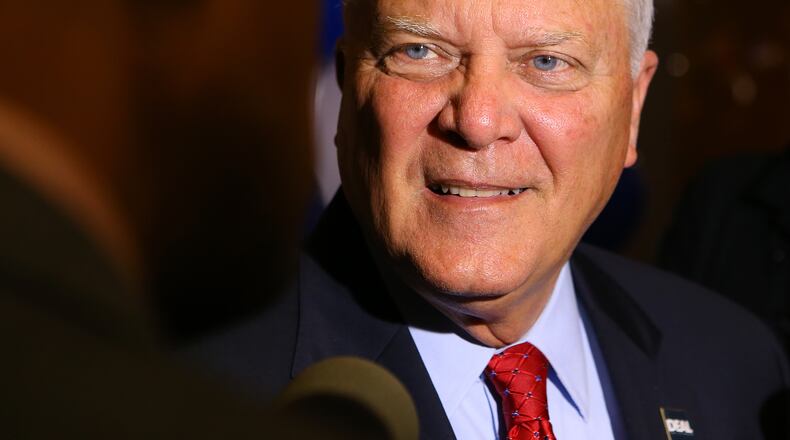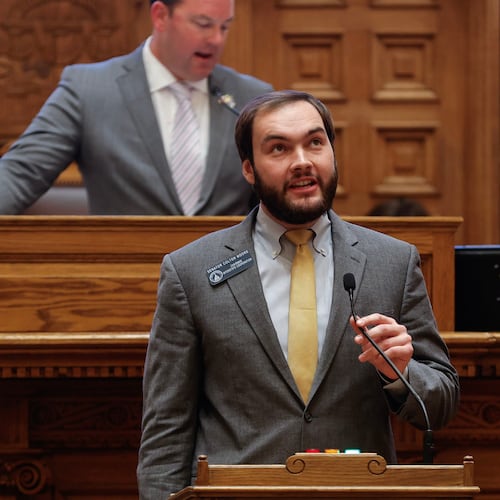Legislation to exempt jet fuel and construction materials used in a Georgia Aquarium expansion from taxes and a bill to raise tag fees for many used-car buyers are advancing through the state House.
A key panel, the state House Ways and Means Committee, approved more than a dozen tax bills Thursday, including Gov. Nathan Deal's measure that puts off dealing with a mammoth state income tax windfall brought about by the federal tax plan that Congress approved in December.
Deal has urged the General Assembly to move rapidly on his bill — which also includes the jet fuel break that mostly benefits air carriers such as Delta Air Lines.
Thursday's votes came less than a week after House Bill 821 was filed.
Last month Deal officials said the state could see a $3.6 billion windfall over the next five years from the federal tax bill. New estimates put the potential windfall much higher.
That’s largely because the federal tax law limited or eliminated some of the deductions Georgians have used when figuring their state taxes in the past and made it far more likely that ratepayers will use the standard federal deduction, rather than lowering their state taxable income using itemized deductions.
So while many Georgians may pay less in federal taxes, at least some will wind up with bigger state tax bills unless lawmakers make some changes in the tax code.
Deal's bill is an annual measure wedding changes in federal tax law to the state tax code, the kind of legislation that gets almost no attention. But the governor made headlines by saying he didn't want the bill to address the potential state windfall.
Some lawmakers have balked at not cutting state taxes to pare the windfall, and Deal this week said he would consider backing a separate bill to do so.
House leaders have been receptive to re-creating a sales tax exemption on jet fuel, something that was done away with in 2015 when Delta officials got on the wrong side of lawmakers.
Eliminating the state tax and most local taxes would amount to a break of about $50 million for airlines and cargo companies, said House Ways and Means Chairman Jay Powell, R-Camilla.
Airlines that fuel up in Georgia pay the fourth-highest tax in the country, with competing states such as Florida, North Carolina and Texas having no or lower taxes. Administration officials say they hope the savings in fuel taxes will persuade airlines such as Delta to provide more direct international flights out of Hartsfield-Jackson International Airport.
Clayton County officials said it would cost local governments about $18 million a year. State House Minority Leader Bob Trammell, D-Luthersville, a member of the Ways and Means Committee, said the exemption legislation unfairly did outsized damage to Clayton.
However, state Rep. Chuck Efstration, R-Dacula, one of Deal's House floor leaders, said Delta pays more property taxes in Clayton County than any other business or individual, and several other airlines are among the top 10.
“Clayton County will continue to collect tax revenue from the airport,” he said.
Efstration also said the exemption would provide Delta and other airlines with the “opportunity to reduce ticket prices.”
The panel also approved House Bill 793, a tax break on construction materials used in a $100 million expansion of the Georgia Aquarium, where a "predator marine life" exhibit is being added, according to the bill's sponsor. The tax break is worth up to $4.5 million. Such exemptions are common for such major projects.
The committee also backed House Bill 327, which critics have said could add an average of $300 to the cost of buying a used car from a dealer.
Under the bill, used-cars buyers would be charged the motor vehicle fee on the sales price of the car or truck sold by a dealer or the book value, whichever is higher. Typically, the sales price is higher.
New cars are currently taxed based on sales price, whereas used cars are taxed at the lower book value.
So, if somebody buys a used car for $10,000 and owes the current 7 percent tax, but the state book value on the vehicle is $8,000, that person pays the taxes on the $8,000, not on what he or she paid for it. The difference in taxes would be $140 in that scenario.
The fight comes out of changes lawmakers made in 2012 when they eliminated the “birthday tax” — or property taxes — on cars after Georgians buy them. That legislation eliminated sales taxes as well, replacing them with a new title fee. The car dealers’ lobbies had been working to change the system for decades.
But new-car dealers weren’t pleased that their customers would pay the fee based on the higher formula while used-car dealers’ customers could use the book value.
A financial accounting of the bill, which passed the chamber last year in another measure but stalled in the Georgia Senate, estimated it would increase state and local taxes by $162 million to $178 million next year if it becomes law.
However, its sponsor, state Rep. Shaw Blackmon, R-Bonaire, said the latest version of the bill would cut the tax rate from 7 percent to 6.75 percent for all vehicles, reducing that windfall by about $60 million.
Never miss a minute of what's happening in Georgia Politics. Subscribe to PoliticallyGeorgia.com.
About the Author
Keep Reading
The Latest
Featured





